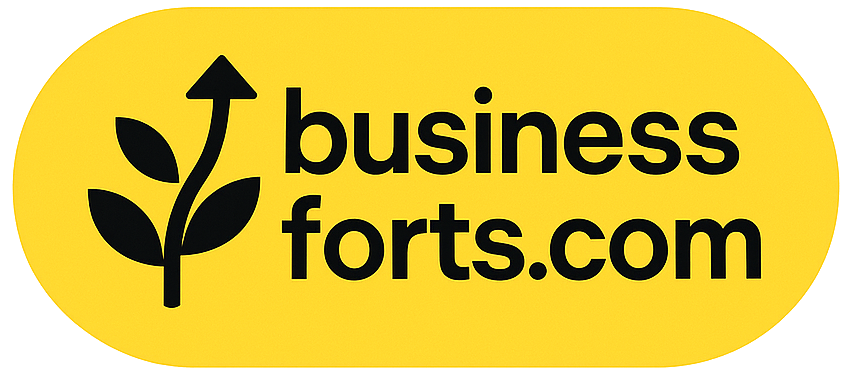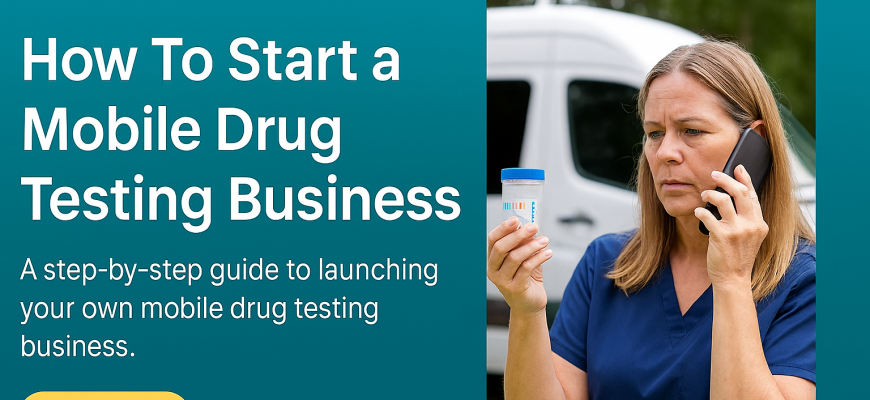As a woman entrepreneur ready to make an impact, launching a mobile drug testing business can be both rewarding and empowering. The drug screening industry is large and growing – for example, a recent report projects the global drug screening market to reach $13.89 billion by 2027, with North America leading demand. Employers today recognize workplace drug and alcohol testing as an essential part of safety and compliance. This guide will walk you through the steps to build a successful mobile testing service from the ground up.
- Understanding the Industry and Market Opportunity
- Licenses, Certifications, and Legal Requirements
- Business Planning and Model Options
- Equipment and Startup Costs
- Operational and Legal Considerations
- Business Model and Growth Strategies
- Marketing Your Mobile Testing Service
- Charting Your Own Course in a High-Demand Industry
Understanding the Industry and Market Opportunity
In the U.S., many industries now require regular drug testing: trucking and transportation, construction and manufacturing, healthcare facilities, government agencies, schools, and more. Mobile testing services bring specimen collection directly to the client’s location, offering convenience and flexibility. For example, a mobile unit can visit a factory, office, school, or event to perform on-site drug and alcohol screens. This is ideal for employers who prefer not to send employees off-site for testing or for those in remote areas. Your target customers might include large employers, staffing firms, rehabilitation clinics, or legal professionals (e.g. in family law) seeking on-demand testing services. Many owners start with one niche – for example, focusing on DOT-compliant testing for truck drivers or 24/7 emergency “reasonable suspicion” calls after workplace accidents.
Licenses, Certifications, and Legal Requirements
To operate legally, you must meet both general business and drug-testing-specific requirements:
-
Business Registration and Local Licenses. Register your company (LLC, corporation, or sole proprietorship) and obtain any required business licenses in your city or county. Check with local authorities about occupational licenses or home business permits – even home-based collectors often need an official business license. Open a separate business bank account and get a dedicated mailing address.
-
Collector and Technician Training. You need formal training to collect drug and alcohol specimens. At a minimum, complete an accredited urine specimen collector training program that meets Department of Transportation (DOT) standards. DOT rules require each collector to successfully finish a qualified training program and pass a monitored proficiency demonstration. Similarly, to perform on-site breath alcohol tests you must complete a DOT-approved Breath Alcohol Technician (BAT) course and proficiency check. These trainings cover all steps of the collection process (chain-of-custody, privacy, handling problem collections) and are non-negotiable for DOT work. Many courses now bundle urine-collector, breathalyzer, and oral-fluid (saliva) collection training.
-
Additional Certifications (Optional). For broader credibility, you can earn industry certifications (such as the Certified Collection Professional credential through NDASA/DATIA). If you plan to offer hair-follicle or instant (point-of-care) tests, make sure you’re trained for those as well and obtain any CLIA waiver if required. Remember that state regulations can vary: research your state’s rules on laboratory or testing licenses, drug testing policies, and any protections (for example, some states limit testing for off-duty marijuana use). Staying informed is key.
Business Planning and Model Options
Write a clear business plan before launching – it’s your roadmap for success. In the plan, describe your services (urine, oral-fluid, hair testing, breathalyzer, etc.), pricing strategy, target customers, and marketing approach. Identify whether you’ll serve businesses only (B2B), individual clients (B2C), or a mix. Most mobile testing companies focus on B2B: contracting with companies, unions, clinics or municipalities for routine, random, or post-accident screening. You might also offer services to individuals in special situations (e.g. pre-employment or court-ordered tests) by partnering with medical labs or walk-in clinics. Define your unique value – for instance, 24/7 availability or specialization in DOT compliance.
Consider your business format and growth path. You could start completely independent, or explore franchise opportunities. For example, USA Mobile Drug Testing offers a franchise model (a turnkey way to start under a known brand). Some entrepreneurs eventually expand into a Consortium/Third-Party Administrator (C/TPA) role: managing entire testing programs for multiple companies or agencies. The most profitable gigs are often emergency on-site calls. Veteran testers report charging $350–$500 per call for late-night or immediate testing (hourly rate with a 2-hour minimum). Choose a business structure (LLC, S-corp, etc.) with your attorney and accountant, and consider franchise vs. independent pros/cons.
Equipment and Startup Costs
Be prepared for a significant initial investment. Startup costs will typically fall in the tens of thousands. Key expenses include:
-
Mobile Unit and Vehicle. If you go fully mobile, budget for a vehicle (van, SUV, or RV). Outfitting and branding a mobile lab can cost roughly $30,000–$50,000. Ensure it has privacy curtains, lockable storage for specimens, and, if needed, a power source or climate control.
-
Testing Equipment and Kits. You’ll need specimen collection kits (urine cups with chain-of-custody forms), breathalyzer (evidential breath testing device), hair or oral test kits if applicable, gloves, antiseptic wipes, and sharps containers. A quality DOT-compliant breathalyzer runs about $3,000–$5,000. Initial supplies (back-up kits, calibration fluids, etc.) often total $5,000–$10,000. Keep extra gloves, biohazard bags, and cleaning supplies on hand.
-
Technology and Software. Use a laptop or tablet in the field to print and scan forms. Invest in software for scheduling, electronic chain-of-custody, results reporting, billing and record-keeping. A comprehensive drug-testing management platform (often cloud-based) streamlines test documentation. Allow a few thousand dollars for a robust computer, portable printer/scanner, and software subscriptions.
-
Facility Costs (if any). If you maintain a small collection office, factor in office rent, utilities, and basic furnishings. A fixed location can add credibility and let you serve walk-in clients or store supplies.
-
Insurance and Professional Services. Insurance is a must. At minimum, carry general liability and professional liability insurance. If you drive clients or have employees, you’ll need commercial auto and workers’ comp coverage. Budget for an attorney and accountant as well, to set up your legal structure, tax ID, and contracts. All told, a typical start-up budget (vehicle, equipment, insurance, website, and working capital) can easily run in the $50,000–$100,000 range. You can fund this through savings, a small business loan, or investors, but start lean: use one vehicle and do most paperwork yourself until revenue grows.
Operational and Legal Considerations
Once you’re up and running, follow strict protocols for every test:
-
Chain of Custody. Maintain an unbroken chain of custody on each specimen. Use official forms and document every handoff (collector to courier to lab). Proper chain-of-custody is legally required – for DOT testing it’s governed by federal rules (49 CFR Part 40).
-
Laboratory Partnerships and MRO. Mobile collectors typically don’t analyze samples; instead, send them to certified labs. Establish accounts with reputable HHS/SAMHSA-certified laboratories for DOT and non-DOT testing. Negotiate pricing and turnaround times. You must also involve a Medical Review Officer (MRO) – a licensed physician who reviews any positive test result and checks for legitimate prescriptions or medical explanations. Many TPA services include both lab analysis and MRO review, which you can bundle to simplify reporting for your clients.
-
Record-Keeping and Privacy. Keep all test results and personal data secure and confidential. In general, drug test results are considered protected medical information (even though DOT urine tests themselves aren’t classified as medical exams, the results must be stored in a separate, confidential file). Follow ADA and HIPAA best practices: file reports in locked cabinets or encrypted databases, and ensure only authorized persons have access. Also file and keep copies of your certifications and training logs – DOT requires collectors to maintain documentation of their qualification training and proficiency.
-
Legal Compliance. Stay current on federal and state drug testing laws. For example, some states now restrict testing or disciplining employees for off-duty use of legal cannabis. Review the U.S. Department of Transportation regulations (49 CFR Part 40) and any relevant state statutes. Consider joining an industry group (like NDASA/DATIA or SAPAA) for resources and updates.
-
Insurance and Liability. Confirm that your insurance policies cover all aspects of your service. Professional liability (errors and omissions) protects you if a client claims mishandling. General liability covers accidents on your watch. Maintain auto coverage for your mobile unit. These precautions protect both your business and your reputation.
Business Model and Growth Strategies
As you build your service, focus on reliability and professionalism. Decide on your pricing structure: many mobile testers charge an hourly rate plus mileage or a flat site fee. For example, after-hours emergency calls are often billed at higher flat rates (industry experts cite $350–$500 per urgent call). For regular accounts, you might charge a per-test fee or a monthly contract rate. Make sure your rates cover your costs while remaining competitive.
Think about expansion from day one. You could hire and train additional collectors as demand grows. Adding a second vehicle or offering new tests (hair, saliva, or even background checks) can attract clients. Eventually, you might open a dedicated collection site or offer managed testing programs (C/TPA services). Throughout, word-of-mouth and referrals are gold. Provide excellent customer service – prompt scheduling, clear reports, and polite professionalism will make clients eager to recommend you. A satisfied client or partner can bring in multiple referrals, accelerating your growth.
Marketing Your Mobile Testing Service
A strong marketing plan will help you get noticed:
-
Online Presence: Build a professional website with clear information about your services and coverage area. Optimize for local search (e.g. “mobile drug testing [Your City]”). Claim your Google Business Profile and encourage clients to leave positive reviews. Maintain active LinkedIn and Facebook pages – post client testimonials, industry news, and helpful tips. Showcasing your certifications and training reassures potential customers. These steps ensure local businesses can find you easily.
-
Networking and Partnerships: Join trade organizations (NDASA/DATIA, SAPAA) and your local Chamber of Commerce. Attend career fairs, industry expositions, or safety conferences where your target clients gather. Connect with HR firms, occupational health clinics, staffing agencies and even local drug treatment centers – they can refer clients. Partnering with background-screening companies or clinical labs (who may not have mobile capability) can also bring leads. In-person introductions and face-to-face meetings are very effective in this field.
-
Educational Outreach: Demonstrate your expertise by educating the market. Write blog articles or social media posts about drug testing best practices and regulations. Host free seminars or webinars for HR managers on topics like “Why Mobile Testing Improves Safety” or “Updates on DOT Testing Rules.” Sending out a monthly email newsletter with industry updates keeps your name front-of-mind. Content marketing not only drives SEO but also positions you as a knowledgeable partner.
-
Referral Programs and Promotions: Offer an incentive for referrals (e.g. a discounted follow-up test). Provide a new-client special rate to encourage trials. Cold outreach (calls or visits to local businesses) is also valuable in the early days. In all marketing, emphasize your unique advantage – for example, your reliability, quick turnaround, 24/7 availability, or the personal care you provide as a local woman-owned business.
Charting Your Own Course in a High-Demand Industry
Starting a mobile drug testing business takes dedication, but it offers meaningful work and strong growth potential. By developing a solid plan, getting properly certified, investing in quality equipment, and marketing strategically, you can build a service that businesses trust. Take it step by step: secure your training and certifications, set up your vehicle and supplies, and start small with a focused customer base. Remember that every successful entrepreneur started with doubts and questions – stay curious, keep learning (knowledge really is power in this industry), and rely on your network for support. With your hard work, expertise, and passion for helping others stay safe, you’ll be well on your way to creating a thriving mobile testing business that makes a real difference.









